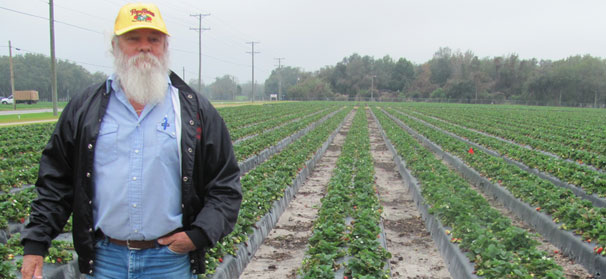

Apr 15, 2011Reusing plastic helps Fancy Farms
Carl Grooms chose the name Fancy Farms on a whim.
Strawberries are one of the neatest crops you can grow. Everything around them should be fancy to accommodate that. It makes the farm look nice for visitors, too, he said.
“Everything on the farm is fancy but me, but I don’t care because I don’t really count.”
Grooms, 61, started his strawberry farm in Plant City, Fla., in 1974, with help from a financial partner, James Crocker. At the time, no bank would give Grooms a loan. He had ability and knowledge, having grown up on a strawberry and vegetable farm in the area, but zero assets. Crocker helped get him started.
“It’s the only thing I knew how to do well,” Grooms said. “I figured I could make more money doing that than working for somebody else.”
The partnership was in place for about three decades, until Grooms and his wife, DeeDee, acquired all the interest in Fancy Farms several years ago. They’re now the sole owners.
At 210 acres, Fancy Farms is one of the larger operations in the 50-mile radius around Plant City – the heart of Florida’s strawberry industry. As one of the founders of the Florida Strawberry Growers Association, Grooms has been active in the industry for decades.
The state’s strawberry harvest runs from December through April. During that time, Grooms hires about 300 workers, mostly Mexican. Some live in his farm’s housing facilities. Many live in the area year round. Without them, he wouldn’t be able to grow berries, he said.
A few years ago, Grooms started reusing his plastic for two, sometimes three, years in a row. At the end of harvest, the plants are killed but the plastic is left in the ground. New seedlings are planted in October, with the same plastic in place. Grooms calls the technique, which isn’t common, his “stimulus plan.” It saves him money and there’s no real downside. He reuses plastic on all his acres now.
Like most growers, his expenses continue to rise while, at the same time, his production has hit a plateau and the price for his berries hasn’t increased much. He’s dealing with more government regulations, too. The squeeze makes it difficult to pay his bills. Like most growers, however, every once in a while he’ll have a good week: More berries will be picked than expected, or the price will be higher than expected. Weeks like that keep the farm going, Grooms said.
Florida has experienced some bad freezes the last couple of winters. Frigid temperatures curtailed about 60 percent of Fancy Farms’ production last December. In mid-March, the season hadn’t ended yet, and Grooms didn’t know what the average price of his strawberries would be. They picked a good volume of fruit overall, he said.
Grooms hauls his berries to a nearby shipping facility owned by Wish Farms, which handles sales and distribution for him. His berries end up in chain stores all over the eastern part of the country, he said.
Grooms has a son, Dustin, 29, who recently came back to the farm after eight years in the military. He hopes Dustin will take over one day, but you never know with these young people.
“I said I’d never farm, but I ended up doing it for over 30 years,” Grooms said. “I’ve earned my living since 1974, digging my dollar out of the dirt.”
By Matt Milkovich














